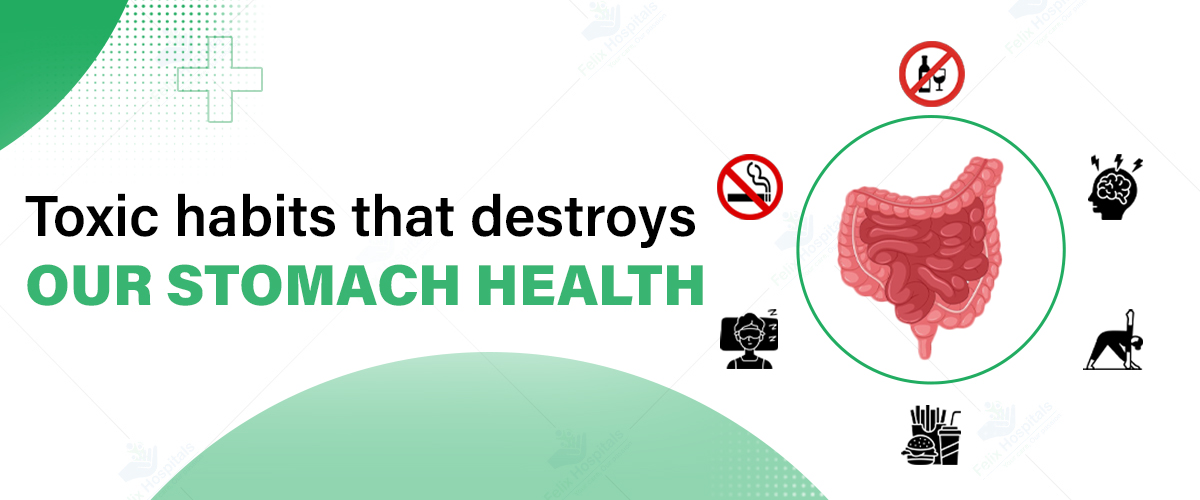
Subscribe to our

Our digestive system plays a central role in our overall health, influencing everything from immunity to mental well-being. Unfortunately, modern lifestyles often include habits that can slowly deteriorate our stomach health, leading to various digestive disorders. Recognizing these toxic habits and understanding their impact on the stomach is crucial for making conscious choices that promote better digestive health. Let’s explore the most common habits that harm stomach health, their underlying causes, and effective prevention strategies, all while considering expert care at the best gastro hospital to help address and manage these issues.
Trust Felix Hospitals for the best Gastroenterologist, specialized medical services, and compassionate support during your critical moments by Clicking Here.
The stomach is a powerful organ responsible for breaking down food, absorbing nutrients, and eliminating waste. It relies on a delicate balance of acid, enzymes, and bacteria to function optimally. When this balance is disrupted, it can lead to symptoms like bloating, pain, acid reflux, and chronic conditions such as gastritis or irritable bowel syndrome (IBS). At Felix Hospitals, we have the best doctor for gastro, ensuring patients receive top-quality care and support for all their digestive health needs.
Here are some of the most damaging habits that can disrupt stomach health:
1. Skipping Meals or Eating Irregularly
Irregular eating patterns can significantly disrupt digestive health. When meals are skipped or eaten at erratic times, the stomach releases digestive acids with no food to process, which can irritate the stomach lining.
2. Overeating
Overeating places undue stress on the stomach, requiring it to produce more acid and digestive enzymes than necessary, which can result in bloating, acid reflux, and indigestion.
3. Excessive Caffeine Intake
While moderate caffeine consumption can be beneficial, excessive intake can harm the stomach lining, leading to acid production that contributes to acid reflux and gastritis.
4. Consuming Processed and Spicy Foods
Processed foods are often high in artificial ingredients, preservatives, and unhealthy fats, which can irritate the stomach. Spicy foods can also exacerbate acid reflux and contribute to stomach discomfort.
5. Eating Too Quickly
Rushing through meals leads to poor chewing and increased air intake, which can cause bloating, gas, and indigestion.
6. Lack of Fiber in the Diet
Fiber is essential for digestion, helping to move food through the digestive tract and prevent constipation. A diet low in fiber can lead to slow digestion and cause issues like constipation and bloating.
7. Overuse of Painkillers and NSAIDs
Non-steroidal anti-inflammatory drugs (NSAIDs) like ibuprofen can irritate the stomach lining, especially when used frequently, leading to gastritis and even stomach ulcers.
8. High Alcohol Consumption
Alcohol is one of the biggest contributors to stomach problems, causing inflammation and even damage to the stomach lining. Excessive drinking can lead to conditions like gastritis and even increase the risk of stomach cancer.
9. Smoking
Smoking is detrimental to stomach health, as it reduces blood flow to the stomach lining and interferes with its protective barrier, making it more susceptible to acid damage.
10. Chronic Stress
Stress impacts the digestive system by increasing acid production, causing inflammation, and slowing down digestion. It can lead to conditions like IBS, acid reflux, and stomach ulcers.
Persistent toxic habits can lead to chronic digestive disorders, which may manifest as:
1. Eat a Balanced Diet
2. Stay Hydrated
3. Avoid Excessive Sugar and Processed Foods
4. Incorporate Probiotics
5. Limit Alcohol and Caffeine
6. Exercise Regularly
7. Manage Stress
8. Listen to Your Body
At Felix Hospital, we are dedicated to providing exceptional care for gastrointestinal health. Our team of esteemed specialists includes:
Trust Felix Hospital for comprehensive care and guidance to restore and maintain optimal stomach health.
Click here to trust Felix Hospitals for the best gastroenterologist, specialized medical services, and compassionate support during your critical moments.
Protecting your stomach health begins with small changes that have big impacts. By avoiding toxic habits and adopting preventive measures, you can maintain a healthy digestive system and avoid chronic stomach issues. With the right choices and support, it’s possible to enjoy optimal digestive health and a better quality of life. For expert advice and personalized care, Felix Hospitals is here to guide you toward a healthier tomorrow.
1. What are the most common signs of poor stomach health?
Ans: Common signs include bloating, acid reflux, indigestion, gas, stomach pain, constipation, and frequent heartburn. Chronic symptoms may indicate a need for medical evaluation.
2. How does stress affect stomach health?
Ans: Stress triggers hormone release that can increase stomach acid, slow digestion, and lead to conditions like IBS, acid reflux, and stomach ulcers. Managing stress can improve overall stomach health.
3. Are there specific foods I should avoid for better stomach health?
Ans: Yes, limiting spicy foods, caffeinated beverages, alcohol, processed foods, and sugar can reduce stomach irritation. Choosing whole, unprocessed foods can promote digestive health.
4. How does smoking impact my stomach?
Ans: Smoking reduces blood flow to the stomach lining and weakens its protective barrier, increasing the risk of acid reflux, ulcers, and other digestive issues. Quitting smoking is highly beneficial for stomach health.
5. What are some easy ways to improve my digestive health?
Ans: Eating a balanced diet rich in fiber, staying hydrated, exercising regularly, managing stress, and eating at regular intervals can significantly enhance digestive health and prevent stomach issues.